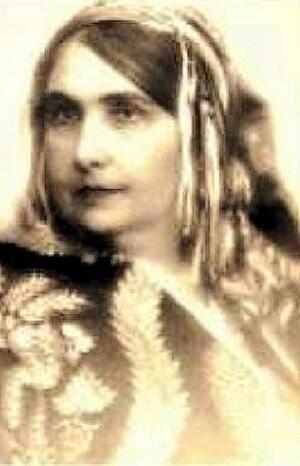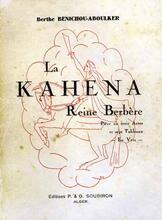Elissa Rhaïs
Elissa Rhaïs had a successful literary career portraying the strong and passionate lives of North African women and the Muslim milieux of the early 20th century. Born in Algeria to a modest Jewish family, Rhaïs moved to France at age 44 and began her career as a writer. Though she was Jewish, she published as a Muslim author in hopes that this would attract readers. She wrote dramatic narratives of the lives of passionate and pleasure-loving heroines, documenting religious celebrations, family relationships, and forbidden loves.
Elissa Rhaïs’s literary fortune was an unusual one. Her novels and short stories, set in exotic Algeria, were a great success among readers of the années folles and were also praised by critics who admired her acute perception of the Muslim soul. By the 1930s, however, an antisemitic pamphlet entitled Le Péril Juif sharply criticized her writing and exposed her as an impostor who was “passing for” Muslim. Thereupon Rhaïs vanished from the literary world for four decades. In 1982, Paul Tabet, her step-nephew’s son, published a book that purported to be a biography, in which he denied her authorship of all the fiction that had been published under her name. He attributed it instead to his own father, who he claimed had been her captive lover and ghost writer. Critics of Maghrebine literature have not supported Tabet’s allegation.
Family and Personal Life
Elissa Rhaïs was born Rosine Boumendil in Blida, Algeria, on December 12th, 1876, into a Jewish family of modest means. Her father Jacob was a baker and her mother, Mazaltov (née Seror), was a homemaker. She was sent to an école communale until the age of twelve, then placed as a domestic in a Jewish family. At eighteen, she married a rabbi, Moise Amar, and moved to Algiers. They had three children: a daughter who died aged eleven, a son, Jacob-Raymond (1902–1987) and a daughter Mireille (1908–1930). By the age of thirty-eight, divorced and remarried to a wealthy businessman, Mardochée Chemouil, she opened a literary salon at her home and soon developed a reputation as an entertaining storyteller. She claimed that the stories she told had been passed down to her by her mother and grandmother and thus represented something of the ancient wealth of her native region’s folklore. Prompted by the few literary critics who attended her soirées, she began sending her stories to literary reviews.
In 1919, Rosine Boumendil decided to try her luck in France. She first had to obtain a legal separation, as her husband disapproved of her literary ambitions. She settled in Paris with her son, her daughter and her adopted son, Raoul-Robert Tabet, a nephew of her second husband. Before the end of the year, she had signed a five-year contract with Plon and her first novel, Saâda la Marocaine, was published under the pen-name of Elissa Rhaïs. Her publishers preferred to conceal her Jewish background, and, with her consent, advertised the novel as the work of a Muslim woman who had learned French at a public French school and then lived in a harem. They hoped this deception would attract readers; novels by a cloistered “Oriental” woman would be sure to contain exciting insights about mysterious Algeria. Furthermore, the fact that she chose to write in the language she had learned in school was living proof of the success of the colonial enterprise. Readers were obviously unaware that Muslim women, unlike Jewish women, had as yet had no access to a French education.
Literary Career
From 1919 to 1930 Elissa Rhaïs wrote nine novels and three collections of short stories. Eager to comply with her publishers’ wish that she produce heart-breaking romances in exotic North African settings, she devoted much of her fiction to a description of domestic life in the Maghreb. Most of her narratives are sentimental tales with female heroines and with few exceptions they depict various Muslim milieux of the two decades preceding World War I. One such exception is Les Juifs ou la fille d’Eléazar, generally regarded as her best work. It offers a sympathetic portrait of middle-class Jewish characters dealing with conflicts of love and tradition. While the novel idealizes the characters who cling to the “old life,” it also stresses the fact that the double appeal of the ancestral model and the Western one was creating a new identity for North African Jews. Neither the adoption of Western values nor the use of French are represented as alienating or traumatic.
Rhaïs’s characterizations are sketchy, her plots melodramatic, and she has a pronounced weakness for the banal conventions of the exotic genre. However, her portraits of women do go beyond the two prevailing stereotypes of colonial times, the odalisque and the “Fatma”. She favored passionate, independent and pleasure-loving heroines and described their daily lives, customs, dress, interiors, religious celebrations, family relationships and forbidden loves with evident delight.
In 1922 Rhaïs moved back to Algeria. By then it was notorious that Raoul Tabet, who had been working as her secretary, was also her lover. In 1930 her daughter died of typhoid fever during a trip they took together to Morocco. Perhaps out of grief, perhaps because the fashion for exotic tales was waning, Elissa Rhaïs never published another book. She died in Blida on August 18th, 1940.
Selected Works
Saâda la Marocaine. Paris: 1919.
Le Café chantant. Paris: 1920.
Les Juifs ou la fille d’Eléazar. Paris: 1921.
La Fille des pachas. Paris: 1922.
La Fille du douar. Paris: 1924.
La Chemise qui porte bonheur. Paris: 1925.
L'Andalouse. Paris: 1925.
Le Mariage de Hanifa. Paris: 1926.
Par la voix de la musique. Paris: 1927.
Le Sein blanc. Paris: 1928.
La Riffaine, suivi de Petits Pachas en exil. Paris; 1929.
La Convertie. Paris: 1930.
“Enfants de Palestine,” in Revue Hebdomadaire, August, 1931, reprinted in Israel, rêve d’une terre nouvelle. edited by Guy Dugas and Michel Abitbol, 531–553. Paris: 1989.
Brahimi, Denise. Femmes arabes et soeurs musulmanes. Paris: Tierce, 1984.
Déjeux, Jean. “Elissa Rhaïs, conteuse algérienne (1876–1940).” Le Maghreb dans l'imaginaire français. Aix-en-Provence: 1985, 47–79.
Déjeux, Jean. Femmes d'Algérie. Paris: Boîte à Documents, 1987.
Dugas, Guy. “Une expression minoritaire: La littérature judéo-maghrébine d'expression française.” In Littératures maghrébines: Colloque Jacqueline Arnaud. Paris: L’Harmattan, 1990, 135–143.
Dugas, Guy. La Littérature judéo-maghrébine d'expression française: Entre Djéha et Cagayous. Paris: L’Harmattan, 1992.




